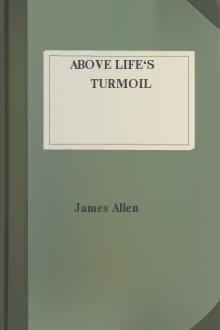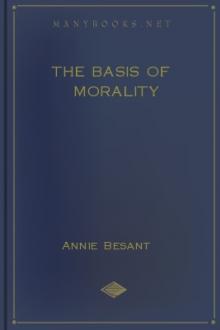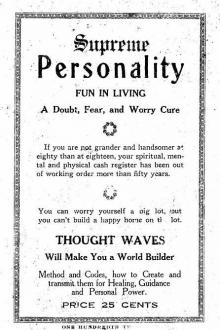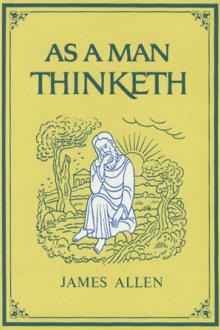Above Life's Turmoil by James Allen (read this if TXT) 📕

- Author: James Allen
- Performer: 1600960979
Book online «Above Life's Turmoil by James Allen (read this if TXT) 📕». Author James Allen
“The Law of the Lord is perfect, enlightening the eyes.” Imperfection lies in man’s ignorance, in man’s blind folly. Perfection, which is knowledge of the Perfect Law, is ready for all who earnestly seek it; it belongs to the order of things; it is yours and mine now if we will only put self-seeking on one side, and adopt the life of self-obliteration.
The knowledge of Truth, with its unspeakable joy, its calmness and quiet strength, is not for those who persist in clinging to their “rights,” defending their “interests,” and fighting for their “opinions”; whose works are imbued with the personal “I,” and who build upon the shifting sands of selfishness and egotism. It is for those who renounce these causes of strife, these sources of pain and sorrow; and they are, indeed, Children of Truth, disciples of the Master, worshippers of the most High.
The Children of Truth are in the world today; they are thinking, acting, writing, speaking; yea, even prophets are amongst us, and their influence is pervading the whole earth. An undercurrent of holy joy is gathering force in the world, so that men and women are moved with new aspirations and hopes, and even those who neither see nor hear, feel within themselves strange yearnings after a better and fuller life.
The Law reigns, and it reigns in men’s hearts and lives; and they have come to understand the reign of Law who have sought out the Tabernacle of the true God by the fair pathway of unselfishness.
God does not alter for man, for this would mean that the perfect must become imperfect; man must alter for God, and this implies that the imperfect must become perfect. The Law cannot be broken for man, otherwise confusion would ensue; man must obey the Law; this is in accordance with harmony, order, justice.
There is no more painful bondage than to be at the mercy of one’s inclinations; no greater liberty than utmost obedience to the Law of Being. And the Law is that the heart shall be purified, the mind regenerated, and the whole being brought in subjection to Love till self is dead and Love is all in all, for the reign of Law is the reign of Love. And Love waits for all , rejecting none. Love may be claimed and entered into now, for it is the heritage of all.
Ah, beautiful Truth! To know that now man may accept his divine heritage, and enter the Kingdom of Heaven!
Oh, pitiful error! To know that man rejects it because of love of self!
Obedience to the Law means the destruction of sin and self, and the realisation of unclouded joy and undying peace.
Clinging to one’s selfish inclinations means the drawing about one’s soul clouds of pain and sorrow which darken the light of Truth; the shutting out of oneself from all real blessedness; for “whatsoever a man sows that shall he also reap.”
Verily the Law reigneth, and reigneth for ever, and Justice and Love are its eternal ministers.
The Supreme Justice
The material universe is maintained and preserved by the equilibrium of its forces.
The moral universe is sustained and protected by the perfect balance of its equivalents.
As in the physical world Nature abhors a vaccum, so in the spiritual world disharmony is annulled.
Underlying the disturbances and destructions of Nature, and behind the mutability of its forms, there abides the eternal and perfect mathematical symmetry; and at the heart of life, behind all its pain, uncertainty, and unrest, there abide the eternal harmony, the unbroken peace, and inviolable Justice.
Is there, then, no injustice in the universe? There is injustice, and there is not. It depends upon the kind of life and the state of consciousness from which a man looks out upon the world and judges. The man who lives in his passions sees injustice everywhere; the man who has overcome his passions, sees the operations of Justice in every department of human life. Injustice is the confused, feverish dream of passion, real enough to those who are dreaming it; Justice is the permanent reality in life, gloriously visible to those who have wakened out of the painful nightmare of self.
The Divine Order cannot be perceived until passion and self are transcended; the Faultless Justice cannot be apprehended until all sense of injury and wrong is consumed in the pure flames of all-embracing Love.
The man who thinks, “I have been slighted, I have been injured, I have been insulted, I have been treated unjustly,” cannot know what Justice is; blinded by self, he cannot perceive the pure Principles of Truth, and brooding upon his wrongs, he lives in continual misery.
In the region of passion there is a ceaseless conflict of forces causing suffering to all who are involved in them. There is action and reaction, deed and consequence, cause and effect; and within and above all is the Divine Justice regulating the play of forces with the utmost mathematical accuracy, balancing cause and effect with the finest precision. But this Justice is not perceived - cannot be perceived - by those who are engaged in the conflict; before this can be done, the fierce warfare of passion must be left behind.
The world of passion is the abode of schisms, quarrellings, wars, law-suits, accusations, condemnations, impurities, weaknesses, follies, hatreds, revenges, and resentments. How can a man perceive Justice or understand Truth who is even partly involved in the fierce play of its blinding elements? As well expect a man caught in the flames of a burning building to sit down and reason out the cause of the fire.
In this realm of passion, men see injustice in the actions of others because, seeing only immediate appearances, they regard every act as standing by itself, undetached from cause and consequence. Having no knowledge of cause and effect in the moral sphere, men do not see the exacting and balancing process which is momentarily proceeding, nor do they ever regard their own actions as unjust, but only the actions of others. A boy beats a defenceless animal, then a man beats the defenceless boy for his cruelty, then a stronger man attcaks the man for his cruelty to the boy. Each believes the other to be unjust and cruel, and himself to be just and humane; and doubtless most of all would the boy justify his conduct toward the animal as altogether necessary. Thus does ignorance keep alive hatred and strife; thus do men blindly inflict suffering upon themselves, living in passion and resentment, and not finding the true way in life. Hatred is met with hatred, passion with passion, strife with strife. The man who kills is himself killed; the thief who lives by depriving others is himself deprived; the beast that preys on others is hunted and killed; the accuser is accused, the condemner is condemned, the denouncer is persecuted.
_”By this the slayer’s knife doth stab himself,
The unjust judge has lost his own defender,
The false tongue dooms its lie, the creeping thief
And spoiler rob to render.
Such is the Law.” _
Passion, also has its active and passive sides. Fool and fraud, oppressor and slave, aggressor and retaliator, the charlatan and the superstitious, complement each other, and come together by the operation of the Law of Justice. Men unconsciously cooperate in the mutual production of affliction; “the blind lead the blind, and both fall together into the ditch.” Pain, grief, sorrow, and misery are the fruits of which passion is the flower.
Where the passion-bound soul sees only injustice, the good man, he who has conquered passion, sees cause and effect, sees the Supreme Justice. It is impossible for such a man to regard himself as treated unjustly, because he has ceased to see injustice. He knows that no one can injure or cheat him, having ceased to injure or cheat himself. However passionately or ignorantly men may act towards him, it cannot possibly cause him any pain, for he knows that whatever comes to him (it may be abuse and persecution) can only come as the effect of what he himself has formerly sent out. He therefore regards all things as good, rejoices in all things, loves his enemies and blesses them that curse him, regarding them as the blind but beneficent instruments by which he is enabled to pay his moral debts to the Great Law.
The good man, having put away all resentment, retaliation, self-seeking, and egotism, has arrived at a state of equilibrium,and has thereby become identified with the Eternal and Universal Equilibrium. Having lifted himself above the blind forces of passion, he understands those forces, contemplates them with a calm penetrating insight, like the solitary dweller upon a mountain who looks down upon the conflict of the storms beneath his feet. For him, injustice has ceased, and he sees ignorance and suffering on the one hand and enlightenment and bliss on the other. He sees that not only do the fool and the slave need his sympathy, but that the fraud and the oppressor are equally in need of it, and so his compassion is extended towards all.
The Supreme Justice and the Supreme Love are one. Cause and effect cannot be avoided; consequences cannot be escaped.
While a man is given to hatred, resentment, anger and condemnation, he is subject to injustice as the dreamer to his dream, and cannot do otherwise than see injustice; but he who has overcome those fiery and binding elements, knows that unerring Justice presides over all, that in reality there is no such thing as injustice in the whole of the universe.
The Use Of Reason
We have heard it said that reason is a blind guide, and that it draws men away from Truth rather than leads them to it. If this were true, it were better to remain, or to become, unreasonable, and to persuade others so to do. We have found, however, that the diligent cultivation of the divine faculty of reason brings about calmness and mental poise, and enables one to meet cheerfully the problems and difficulties of life.
It is true there is a higher light than reason; even that of the Spirit of Truth itself, but without the aid of reason, Truth cannot be apprehended. They who refuse to trim the lamp of reason will never, whilst they so refuse, perceive the light of Truth, for the light of reason is a reflection of that Light.
Reason is a purely abstract quality, and comes midway between the animal and divine consciousness in man, and leads, if rightly employed, from the darkness





Comments (0)